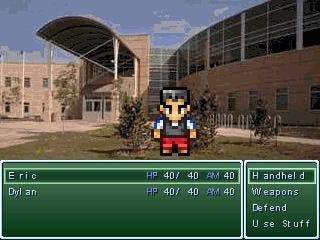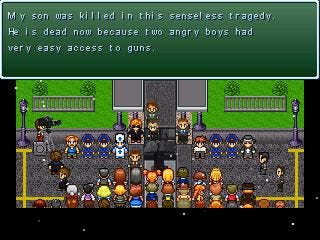Super Columbine Massacre RPG - Part 2
Have videogames gone far enough?
The Slamdance Festival contacted Bogost to ask if he'd be willing to give his opinion on the game just before the decision was made to strike it from the awards shortlist. However, before he was properly interviewed the announcement was made to the press. Eurogamer asked Bogost why he thought Slamdance were wrong to censor the game from their festival. "Slamdance is a juried festival," he explained. "The game was selected among entries by a panel of judges to advance to the festival. The purpose of the festival - for films and games alike - is to give independent and experimental voices a place to be shown and seen, where otherwise they might not have one. By singling out one title for unilateral exclusion, Slamdance has shown that those values are in fact a sham."
The decision not only implies the festival organisers made a mistake with their initial invitation but also that they perhaps now believe the game to be irresponsible. However, right from the game's initial release onto the Internet LeDonne provided discussion forums on the game's official website to allow players to discuss the game and the issues it raises. Eurogamer asked him why this was so important to him: "I didn't make this game for money (it's a free download); I didn't make this game for fame (I was anonymous for over a year): What's left then? I made the game because I was a kid in Colorado when the shooting occurred, because I was frustrated with how the press portrayed videogames as complicit in this (and many other) shootings, and because I felt like there was so much to the Columbine shooting that most people weren't paying attention to (namely why the two boys became so angry and detached). So to foster awareness in these areas, I put up a place for people to discuss these and other emerging issues."
German politicians have recently been discussing introducing a law that could see crimes against videogame entities punishable in the real world. Such acts might be easier to pinpoint in a mindlessly violent game but in SCMRPG one player might play with a view to learning about the killers, their motivations and the circumstances that led up to their actions; Another might then play the game simply to role-play killing some teenagers in a school canteen for kicks. These two scenarios would be near impossible to distinguish in a court of law. Eurogamer asked LeDonne if he thought the opportunity for misuse of interactive media was a valid case for banning it?

"Well, I think the idea of 'banning' a game, a poem, or a dance is deeply worrisome. What you speak about really asks us to consider the role that parents and others take in the developmental process of young people. I think that anyone who would kill others after playing a video game is a deeply disturbed individual and would find any media available to further such a demented personal ethic.
"Would we have school shootings even without videogames? Yes. We would even have school shootings without guns; they would be worse, I predict, because the ingredients to make propane bombs (like Eric and Dylan's) can be purchased at a hardware store and could potentially kill hundreds of people at once.
So the real issue for understanding violence has nothing to do with whether one has read Catcher in the Rye (as John Lennon's assassin did) or listening to The Beatles (as Charles Manson did). I think these kinds of reactionary gestures may satisfy a nervous public in the short-run but really they only provide false comfort as the real causes remain unaddressed - one of the overarching themes in SCMRPG.

Whatever your position on the game it's impossible to deny that SMCRPG has raised a great many issues that are becoming increasingly relevant to the mainstream videogames debate. But there's a sense in which this homebrew RPG - a way for a bullied schoolboy also living in Colorado at the time of the killings to try to understand why other ostracised schoolboys would have dealt with their experiences in such a destructive way - was never meant to carry so many issues into the public spotlight. Eurogamer asked LeDonne whether he thought its shoulders are broad enough to carry the issues.
"I don't think SCMRPG (or any other single game) is 'broad enough' to carry all the issues raised by its content," added LeDonne. "I think of SCMRPG as a contribution to what games can someday be. The reason the spotlight on this game is so intense and scrutinising is because it's attempting to walk a path most have so far stayed well away from and, as a result, is a lightening rod for both agenda-driven criticism and praise. It's been called 'ghastly and horrible' by some and 'the Rosa Parks of videogames' by others.
"In the end, I suppose SCMRPG was ultimately just a personal statement I made that a variety of people found a variety of responses to. However, as I was making the game it changed me. I realised how I was able to save myself from the same fate as the main characters I was looking at so closely: I found things I loved in life whereas they let themselves grow to hate almost everything. If even one other teenager reads this and reciprocates that sentiment, I'll feel extremely validated."
More information on how to play Super Columbine Massacre RPG! as well as discussion forums about the game and the issues it raises can be found at the official website.
